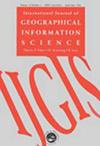Deriving map images of generalised mountain roads with generative adversarial networks
IF 4.3
1区 地球科学
Q1 COMPUTER SCIENCE, INFORMATION SYSTEMS
International Journal of Geographical Information Science
Pub Date : 2022-10-20
DOI:10.1080/13658816.2022.2123488
引用次数: 13
Abstract
Abstract Map generalisation is a process that transforms geographic information for a cartographic at a specific scale. The goal is to produce legible and informative maps even at small scales from a detailed dataset. The potential of deep learning to help in this task is still unknown. This article examines the use case of mountain road generalisation, to explore the potential of a specific deep learning approach: generative adversarial networks (GAN). Our goal is to generate images that depict road maps generalised at the 1:250k scale, from images that depict road maps of the same area using un-generalised 1:25k data. This paper not only shows the potential of deep learning to generate generalised mountain roads, but also analyses how the process of deep learning generalisation works, compares supervised and unsupervised learning and explores possible improvements. With this experiment we have exhibited an unsupervised model that is able to generate generalised maps evaluated as good as the reference and reviewed some possible improvements for deep learning-based generalisation, including training set management and the definition of a new road connectivity loss. All our results are evaluated visually using a four questions process and validated by a user test conducted on 113 individuals.基于生成对抗网络的泛化山路地图图像提取
摘要地图泛化是一个在特定尺度上为制图师转换地理信息的过程。目标是从详细的数据集中生成清晰易懂、信息丰富的地图,即使是小规模的地图。深度学习在这项任务中的帮助潜力仍然未知。本文考察了山路泛化的用例,以探索一种特定深度学习方法的潜力:生成对抗性网络(GAN)。我们的目标是从使用未概括的1:25k数据描述同一地区道路地图的图像中生成以1:250k比例尺概括的道路地图图像。本文不仅展示了深度学习生成泛化山路的潜力,还分析了深度学习泛化过程的工作原理,比较了监督学习和非监督学习,并探索了可能的改进措施。通过这个实验,我们展示了一个无监督模型,该模型能够生成与参考一样好的通用地图,并回顾了基于深度学习的通用化的一些可能改进,包括训练集管理和新道路连通性损失的定义。我们使用四个问题的过程对所有结果进行了可视化评估,并通过对113人进行的用户测试进行了验证。
本文章由计算机程序翻译,如有差异,请以英文原文为准。
求助全文
约1分钟内获得全文
求助全文
来源期刊
CiteScore
11.00
自引率
7.00%
发文量
81
审稿时长
9 months
期刊介绍:
International Journal of Geographical Information Science provides a forum for the exchange of original ideas, approaches, methods and experiences in the rapidly growing field of geographical information science (GIScience). It is intended to interest those who research fundamental and computational issues of geographic information, as well as issues related to the design, implementation and use of geographical information for monitoring, prediction and decision making. Published research covers innovations in GIScience and novel applications of GIScience in natural resources, social systems and the built environment, as well as relevant developments in computer science, cartography, surveying, geography and engineering in both developed and developing countries.

 求助内容:
求助内容: 应助结果提醒方式:
应助结果提醒方式:


